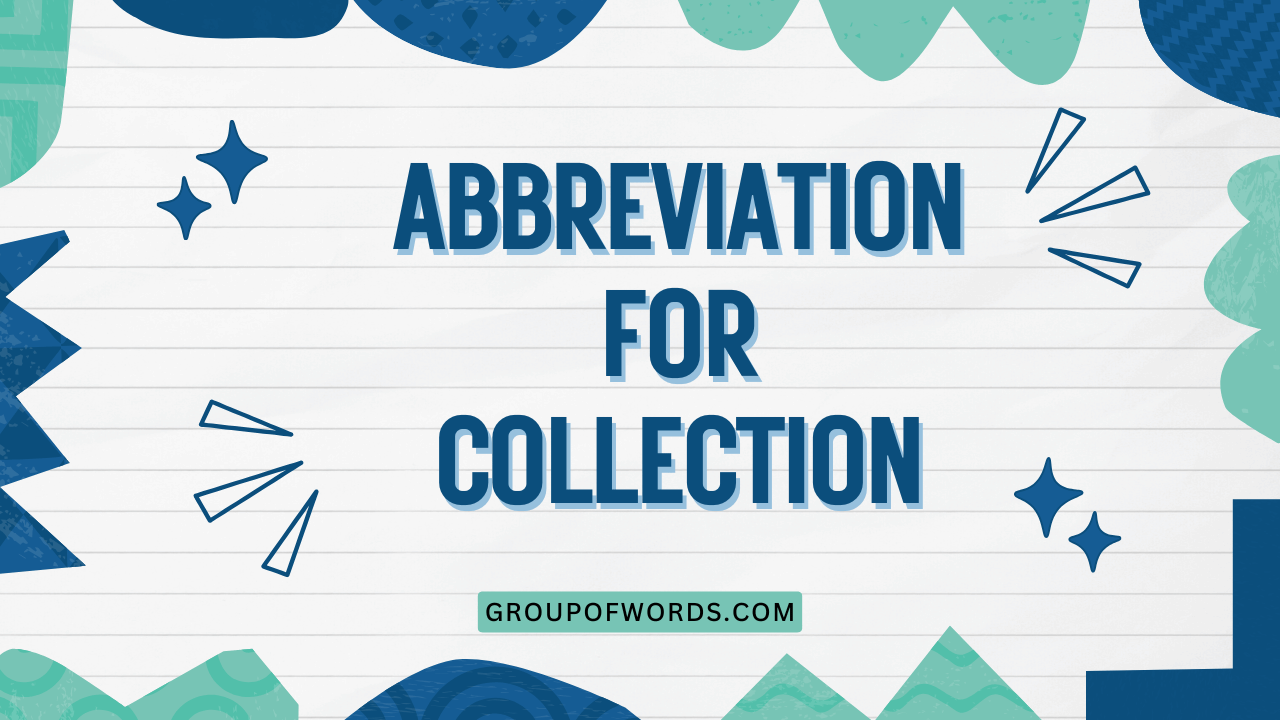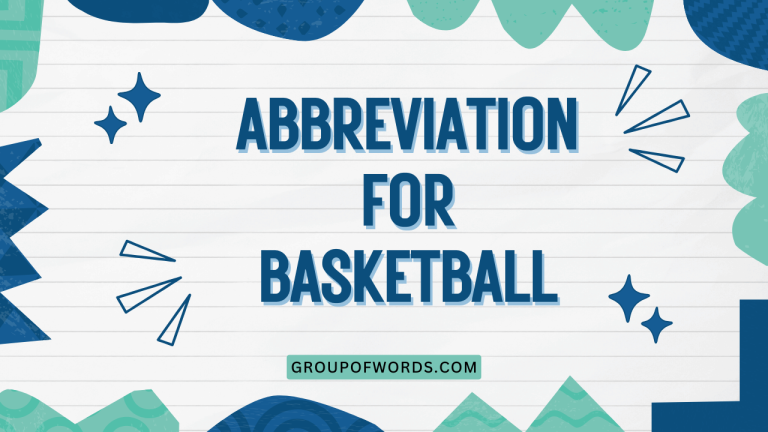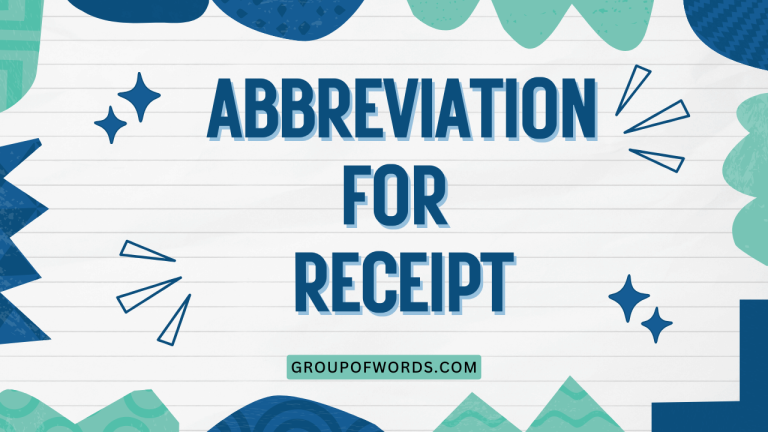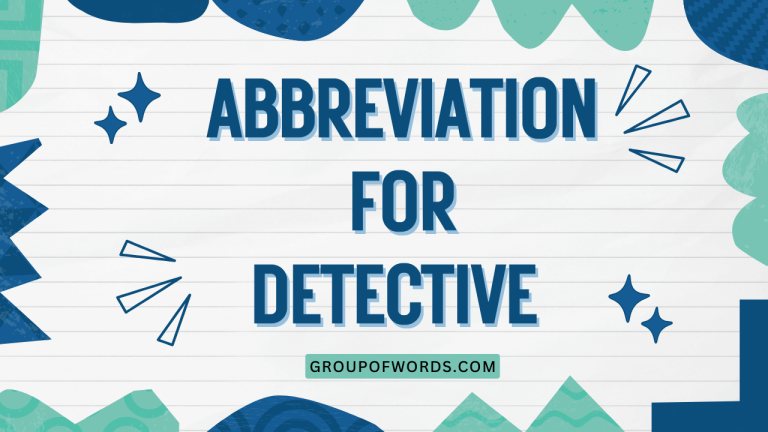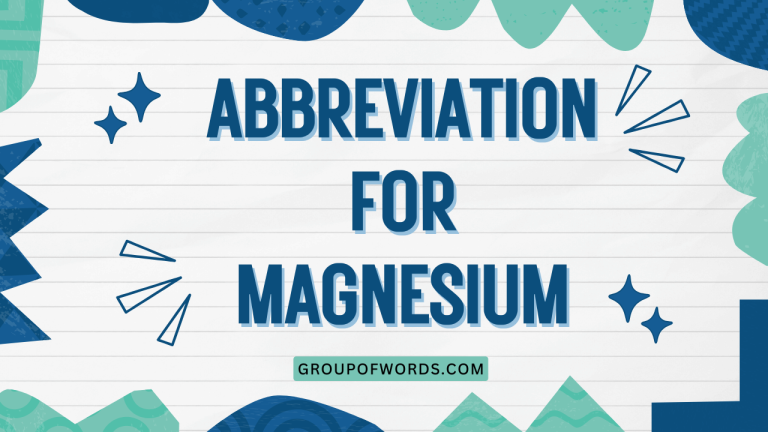Abbreviations for “Collection”: A Comprehensive Guide
Understanding how to abbreviate the word “collection” is essential in various contexts, from academic writing to cataloging and everyday communication. The correct abbreviation not only saves space and time but also maintains clarity and professionalism.
This article provides a comprehensive guide to the common abbreviations for “collection,” exploring their usage, rules, and potential pitfalls. Whether you’re a student, a librarian, a collector, or simply someone looking to improve their English grammar, this guide will equip you with the knowledge to use these abbreviations confidently and accurately.
This article will delve into the nuances of abbreviating “collection,” offering numerous examples and practical exercises to solidify your understanding. We will cover the most common abbreviations, such as “coll.” and “co.,” and discuss the contexts in which each abbreviation is appropriate.
Furthermore, we will address common mistakes and provide clear guidelines to avoid confusion. By the end of this article, you will have a firm grasp of how and when to use abbreviations for “collection” effectively.
Table of Contents
- Introduction
- Definition of Collection and Its Abbreviations
- Structural Breakdown of Abbreviations
- Types and Categories of Abbreviations
- Examples of Abbreviations in Use
- Usage Rules for Abbreviations
- Common Mistakes to Avoid
- Practice Exercises
- Advanced Topics
- Frequently Asked Questions
- Conclusion
Definition of Collection and Its Abbreviations
A collection refers to a group of items of the same type that have been gathered or acquired over a period of time. These items often share a common theme, purpose, or origin. Collections can range from tangible objects like stamps, coins, and art to intangible assets like data, information, and even memories. In various fields, such as libraries, museums, and data science, the term “collection” is frequently used to describe organized sets of resources.
The primary abbreviations for “collection” are “coll.” and “co.” While both are used to shorten the word, their contexts and applications differ slightly. Understanding these differences is crucial for effective communication. “Coll.” is generally used in academic writing, library catalogs, and archival descriptions, while “co.” is more common in commercial contexts, such as indicating a collection agency or a company.
Classification and Function
Abbreviations, in general, serve the function of shortening words or phrases to save space and time. They are classified into different types based on how they are formed: acronyms, initialisms, and clipped forms.
“Coll.” is a clipped form, where the word is shortened by removing letters from the end. “Co.” can be considered a truncation, where only the first few letters are used.
The function of abbreviating “collection” is to provide a concise way to refer to a group of items, especially when the term is used repeatedly. This is particularly useful in contexts where brevity is important, such as in databases, inventories, and research papers.
The choice of abbreviation depends on the specific context and the conventions of the field in which it is being used.
Contexts of Use
The abbreviation “coll.” is commonly found in academic and professional settings. For instance, in a library catalog, a book might be listed as part of a “special coll.” indicating a specific collection of rare or unique books.
In research papers, “coll.” might be used to refer to a data collection or a set of experimental results. In archival science, it denotes a grouping of related materials.
The abbreviation “co.” is more often encountered in business and legal contexts. For example, a debt collection agency might be referred to as a “collection co.” In some cases, it might also be used informally to refer to a group of items, although this usage is less common and should be avoided in formal writing.
The abbreviation “co.” is also commonly used as an abbreviation for “company.”
Structural Breakdown of Abbreviations
Understanding the structure of abbreviations helps in recognizing and using them correctly. Abbreviations are typically formed by shortening a word while retaining enough of its original form to be easily recognizable.
The abbreviation “coll.” is formed by taking the first four letters of “collection,” while “co.” uses only the first two.
Punctuation
The use of punctuation in abbreviations can vary depending on style guides and conventions. In American English, it is common to use a period after “coll.” to indicate that it is an abbreviation.
However, in British English, the period is often omitted, especially if the abbreviation includes the first and last letters of the word. The abbreviation “co.” typically includes a period in both American and British English, though this can vary depending on context (especially when ‘co’ is used for ‘company’).
It’s essential to consult the relevant style guide (e.g., APA, MLA, Chicago) to determine the appropriate punctuation for abbreviations in academic and professional writing. Consistency is key to maintaining clarity and professionalism.
Capitalization
The capitalization of abbreviations depends on the context and the capitalization of the full word. If “collection” is used as part of a proper noun, the abbreviation should also be capitalized.
For example, “Smith Coll.” would refer to Smith Collection, a named collection of items. However, if “collection” is used as a common noun, the abbreviation should be lowercase (e.g., “rare book coll.”).
In general, it is best to follow the capitalization rules of the specific style guide or convention being used. If in doubt, it is often safer to use lowercase unless there is a clear reason to capitalize the abbreviation.
Types and Categories of Abbreviations
Abbreviations can be categorized based on their formation and usage. Understanding these categories can help in choosing the appropriate abbreviation for a given context.
We will examine the different types of abbreviations relevant to “collection.”
Clipped Abbreviations
Clipped abbreviations, like “coll.,” are formed by removing letters from the end of a word. This type of abbreviation is common in academic and professional writing, where brevity is valued.
“Coll.” is a straightforward and widely recognized abbreviation for “collection” in these contexts.
Truncated Abbreviations
Truncated abbreviations, such as “co.,” are formed by using only the first few letters of a word. This type of abbreviation is often used in commercial and legal contexts.
“Co.” is a common abbreviation for “company,” but it can also be used to abbreviate “collection” in specific cases, such as referring to a collection agency.
Context-Specific Abbreviations
Some abbreviations are specific to certain fields or industries. For example, in data science, “coll.” might be used to refer to a data collection, while in library science, it might refer to a specific collection of books or manuscripts.
It is important to be aware of these context-specific abbreviations and to use them appropriately.
Examples of Abbreviations in Use
To illustrate the proper usage of abbreviations for “collection,” let’s examine various examples in different contexts. These examples will cover both “coll.” and “co.,” highlighting their specific applications and nuances.
Examples Using “Coll.”
The following table provides examples of how “coll.” is used in academic, library, and archival contexts. The examples demonstrate the abbreviation in sentences and phrases to provide a clear understanding of its application.
| Context | Example Sentence |
|---|---|
| Library Science | The library houses a rare book coll. dating back to the 18th century. |
| Archival Studies | The archival coll. includes letters, photographs, and documents from the Civil War era. |
| Academic Research | The data coll. involved surveying over 500 participants. |
| Museum Studies | The museum’s art coll. features works from various periods and styles. |
| Cataloging | Each item in the coll. is meticulously cataloged and described. |
| Special Collections | The university’s special coll. includes rare manuscripts and early printed books. |
| Research Papers | The study utilized a comprehensive data coll. to analyze the trends. |
| Library Archives | The historical society maintains a valuable coll. of local newspapers. |
| Art History | The gallery’s permanent coll. showcases works by renowned artists. |
| Database Management | The database includes a coll. of customer reviews and feedback. |
| Historical Research | Researchers accessed the primary source coll. for their analysis. |
| Literary Studies | The library’s poetry coll. includes works by both classic and contemporary poets. |
| Scientific Research | The team gathered a large coll. of soil samples for the experiment. |
| Medical Research | The hospital maintains a coll. of patient records for research purposes. |
| Legal Studies | The law firm has a comprehensive coll. of case files and legal documents. |
| Environmental Science | The institute’s environmental coll. includes data on air and water quality. |
| Sociology | The sociologist analyzed a wide-ranging coll. of survey responses. |
| Political Science | The political scientist studied a coll. of speeches and policy documents. |
| Economic Research | The economist examined a detailed coll. of financial data. |
| Educational Research | The educator compiled a coll. of student essays and assignments. |
| Anthropology | The anthropologist studied a rich coll. of cultural artifacts. |
| Archaeology | The archaeologist excavated a significant coll. of ancient tools. |
| Musicology | The musicologist analyzed a diverse coll. of musical scores. |
| Film Studies | The film scholar curated a coll. of classic and contemporary films. |
Examples Using “Co.”
The following table provides examples of how “co.” is used, primarily in commercial and business-related contexts. Note that while “co.” is more commonly used as an abbreviation for “company,” it can sometimes be used to refer to a “collection company.” These examples highlight its specific applications.
| Context | Example Sentence |
|---|---|
| Debt Collection | The bank hired a co. to recover the outstanding debt. |
| Business | ABC Co. announced a new product line targeting younger consumers. |
| Legal | The law firm represented the co. in the contract dispute. |
| Finance | The investment co. manages a diverse portfolio of assets. |
| Marketing | The marketing co. developed a creative campaign for the brand. |
| Sales | The sales co. exceeded its quarterly targets. |
| Real Estate | The real estate co. specializes in commercial properties. |
| Construction | The construction co. is building a new residential complex. |
| Technology | The tech co. launched a new artificial intelligence platform. |
| Consulting | The consulting co. provides strategic advice to businesses. |
| Manufacturing | The manufacturing co. produces a wide range of industrial products. |
| Retail | The retail co. operates a chain of department stores. |
| Healthcare | The healthcare co. provides medical services to patients. |
| Education | The education co. offers online courses and training programs. |
| Energy | The energy co. is developing renewable energy sources. |
| Transportation | The transportation co. provides logistics and delivery services. |
| Insurance | The insurance co. offers various types of coverage. |
| Telecommunications | The telecommunications co. provides internet and phone services. |
| Media | The media co. produces television shows and movies. |
| Entertainment | The entertainment co. organizes concerts and events. |
| Food and Beverage | The food and beverage co. manufactures and distributes food products. |
| Pharmaceuticals | The pharmaceutical co. develops and sells prescription drugs. |
| Aerospace | The aerospace co. designs and builds aircraft and spacecraft. |
| Automotive | The automotive co. manufactures and sells cars and trucks. |
Examples of Abbreviations in Different Fields
The following table illustrates how abbreviations for “collection” can be used in various fields, providing context-specific examples. This will help you understand how the usage can vary across different disciplines.
| Field | Abbreviation | Example Sentence |
|---|---|---|
| Library Science | Coll. | The library’s rare book coll. is available for scholarly research. |
| Data Science | Coll. | The data scientist analyzed a large coll. of user behavior data. |
| Debt Recovery | Co. | The bank outsourced the debt co. to improve recovery rates. |
| Museum Studies | Coll. | The museum’s artifact coll. showcases the region’s history. |
| Business | Co. | The investment co. manages a diverse portfolio of assets. |
| Archival Science | Coll. | The archival coll. contains primary source documents. |
| Finance | Co. | The holding co. owns several subsidiary businesses. |
| Academic Research | Coll. | The research study used a comprehensive data coll.. |
| Law | Co. | The law firm represents the insurance co. in litigation. |
| Publishing | Coll. | The publisher released a new coll. of short stories. |
| Healthcare | Co. | The healthcare co. provides services to underserved communities. |
| Environmental Science | Coll. | The environmental study included a coll. of water samples. |
| Retail | Co. | The retail co. operates stores nationwide. |
| Engineering | Coll. | The engineering project involved a coll. of technical specifications. |
| Education | Co. | The education co. offers online learning resources. |
| Music | Coll. | The music library features a vast coll. of classical recordings. |
| Government | Coll. | The government agency maintains a coll. of statistical data. |
| Nonprofit | Co. | The nonprofit co. provides social services to the community. |
Usage Rules for Abbreviations
To ensure correct and effective use of abbreviations for “collection,” it is important to follow specific usage rules. These rules cover punctuation, capitalization, context, and style guide conventions.
Punctuation Rules
In American English, always use a period after “coll.” to indicate that it is an abbreviation. For example, “The library’s rare book coll. is extensive.” In British English, the period is often omitted if the abbreviation includes the first and last letters of the word, but it is still acceptable to use a period.
When using “co.” as an abbreviation for “company”, a period is typically included. For example, “ABC Co. is a leading manufacturer.”
Consistency is key. Choose a style and stick to it throughout your writing.
If you are unsure, consult the relevant style guide for your field or publication.
Capitalization Rules
Capitalize the abbreviation if “collection” is part of a proper noun or title. For instance, “Smith Coll.” refers to the Smith Collection.
If “collection” is used as a common noun, use lowercase: “The rare book coll. includes first editions.”
Always follow the specific capitalization rules of the style guide you are using. Be mindful of context and ensure that your capitalization is appropriate.
Contextual Rules
Use “coll.” in academic, library, and archival contexts. This abbreviation is widely recognized and accepted in these fields.
Avoid using “co.” in these contexts, as it is generally associated with commercial entities or “company.”
Use “co.” primarily in business and legal contexts. This abbreviation is commonly used to refer to companies and collection agencies.
However, be clear in your writing to avoid ambiguity; if referring to a group of items within a company, “coll.” might still be more appropriate.
Style Guide Conventions
Adhere to the specific style guide requirements for your field or publication. Different style guides (e.g., APA, MLA, Chicago) may have different rules for abbreviations.
For instance, some style guides may prefer spelling out “collection” in full in certain contexts.
Always consult the relevant style guide and follow its recommendations. This will ensure consistency and professionalism in your writing.
Common Mistakes to Avoid
Even with a solid understanding of the rules, it is easy to make mistakes when using abbreviations for “collection.” Here are some common errors to avoid:
Incorrect Punctuation
Incorrect: The library has a rare book coll
Correct: The library has a rare book coll.
Incorrect: ABC Co
Correct: ABC Co.
Always include a period after “coll.” (in American English) and “co.” to indicate that they are abbreviations. Be consistent with your punctuation throughout your writing.
Incorrect Capitalization
Incorrect: smith coll.
Correct: Smith Coll.
Incorrect: abc co.
Correct: ABC Co.
Capitalize the abbreviation when it is part of a proper noun or title. Use lowercase when “collection” is used as a common noun.
Misusing Abbreviations in the Wrong Context
Incorrect: The research paper cited data co.
Correct: The research paper cited data coll.
Incorrect: The debt coll. contacted the customer.
Correct: The debt co. contacted the customer.
Use “coll.” in academic and research contexts and “co.” in business and legal contexts. Be mindful of the specific context and choose the appropriate abbreviation.
Overusing Abbreviations
Incorrect: The coll. of artifacts was extensive. The coll. included items from various cultures. The coll. was well-preserved.
Correct: The collection of artifacts was extensive. The collection included items from various cultures. The collection was well-preserved.
Avoid overusing abbreviations, especially in general writing. Spell out “collection” in full unless brevity is essential or the abbreviation is widely accepted in the specific context.
Practice Exercises
To test your understanding of abbreviations for “collection,” complete the following exercises. Choose the correct abbreviation for each sentence, or correct the sentence if the abbreviation is used incorrectly.
Exercise 1: Choose the Correct Abbreviation
| Question | Options | Answer |
|---|---|---|
| The library’s rare book _____ is extensive. | a) coll. b) co. | a) coll. |
| ABC _____ announced a new product line. | a) coll. b) Co. | b) Co. |
| The data _____ involved surveying 500 participants. | a) coll. b) co. | a) coll. |
| The debt _____ contacted the customer regarding the overdue payment. | a) coll. b) co. | b) co. |
| The museum’s art _____ features works from various periods. | a) coll. b) co. | a) coll. |
| The marketing _____ developed a creative campaign for the brand. | a) coll. b) Co. | b) Co. |
| The archival _____ includes letters and documents from the Civil War. | a) coll. b) co. | a) coll. |
| The research study used a comprehensive data _____. | a) coll. b) co. | a) coll. |
| The sales _____ exceeded its quarterly targets. | a) coll. b) Co. | b) Co. |
| The historical society maintains a valuable _____ of local newspapers. | a) coll. b) co. | a) coll. |
Exercise 2: Correct the Incorrect Sentences
| Question | Corrected Sentence |
|---|---|
| The library has a rare book coll. | The library has a rare book coll. |
| ABC Co announced a new product line. | ABC Co. announced a new product line. |
| The research paper cited data co. | The research paper cited data coll. |
| The debt coll contacted the customer. | The debt co. contacted the customer. |
| The museum’s art coll features works from various periods. | The museum’s art coll. features works from various periods. |
| Smith coll is known for its extensive archives. | Smith Coll. is known for its extensive archives. |
| The marketing co developed a creative campaign. | The marketing Co. developed a creative campaign. |
| The archival coll includes letters and documents. | The archival coll. includes letters and documents. |
| The sales co exceeded its quarterly targets. | The sales Co. exceeded its quarterly targets. |
| The historical society maintains a valuable coll of newspapers. | The historical society maintains a valuable coll. of newspapers. |
Advanced Topics
For advanced learners, there are several more complex aspects of abbreviations for “collection” to consider. These include regional variations, evolving usage, and the impact of digital communication.
Regional Variations
As mentioned earlier, the use of periods in abbreviations can vary between American and British English. In American English, it is standard to include a period after “coll.” and “co.” In British English, the period is often omitted after “coll.” but usually retained after “co.” Be aware of these regional differences and adapt your usage accordingly.
Evolving Usage
Language is constantly evolving, and the usage of abbreviations can change over time. New abbreviations may emerge, and the meanings of existing abbreviations may shift.
Stay updated on current usage and consult reputable sources to ensure that you are using abbreviations correctly.
Impact of Digital Communication
Digital communication, such as email and social media, often favors brevity and informality. In these contexts, it may be acceptable to use abbreviations more liberally, even if they are not strictly correct according to formal style guides.
However, be mindful of your audience and the overall tone of your communication. In formal or professional settings, always adhere to established rules and conventions.
Frequently Asked Questions
Here are some frequently asked questions about abbreviations for “collection,” along with detailed answers to help clarify any remaining points.
- Is it always necessary to use a period after “coll.”?
In American English, yes, it is generally necessary to use a period after “coll.” to indicate that it is an abbreviation. In British English, the period is often omitted, but it is still acceptable to include it. - When should I use “coll.” versus “co.”?
Use “coll.” in academic, library, and archival contexts to refer to a collection of items. Use “co.” primarily in business and legal contexts to refer to a company or collection agency. - Can “co.” ever be used to refer to a collection of items?
While “co.” is primarily used as an abbreviation for “company,” it can sometimes be used informally to refer to a group of items. However, this usage is less common and should be avoided in formal writing. - Do I need to capitalize “coll.” if it’s part of a title?
Yes, if “collection” is part of a proper noun or title, the abbreviation should be capitalized. For example, “Smith Coll.” refers to the Smith Collection. - What if I’m not sure which abbreviation to use?
If you are unsure which abbreviation to use, it is often best to spell out “collection” in full. This will avoid any potential confusion and ensure that your meaning is clear. - Are there any style guides that have specific rules about abbreviations for “collection”?
Yes, different style guides (e.g., APA, MLA, Chicago) may have specific rules about abbreviations. Consult the relevant style guide for your field or publication and follow its recommendations. - Is it acceptable to use abbreviations more liberally in digital communication?
In digital communication, such as email and social media, it may be acceptable to use abbreviations more liberally, but be mindful of your audience and the overall tone of your communication. - How can I stay updated on evolving usage of abbreviations?
Stay updated on current usage by consulting reputable sources, such as dictionaries, style guides, and professional publications. Pay attention to how abbreviations are used in your field and adapt your usage accordingly.
Conclusion
Mastering the abbreviations for “collection” – “coll.” and “co.” – is an essential skill for clear and effective communication in various contexts. Understanding the nuances of their usage, including punctuation, capitalization, and contextual appropriateness, ensures that you can use these abbreviations confidently and accurately.
Remember that “coll.” is generally preferred in academic and archival settings, while “co.” is more common in business and legal environments.
By following the guidelines and examples provided in this article, you can avoid common mistakes and enhance the professionalism of your writing. Always consult relevant style guides and stay updated on evolving language trends to ensure that your usage remains current and correct.
With practice and attention to detail, you can confidently incorporate these abbreviations into your vocabulary and communicate effectively in any setting.
